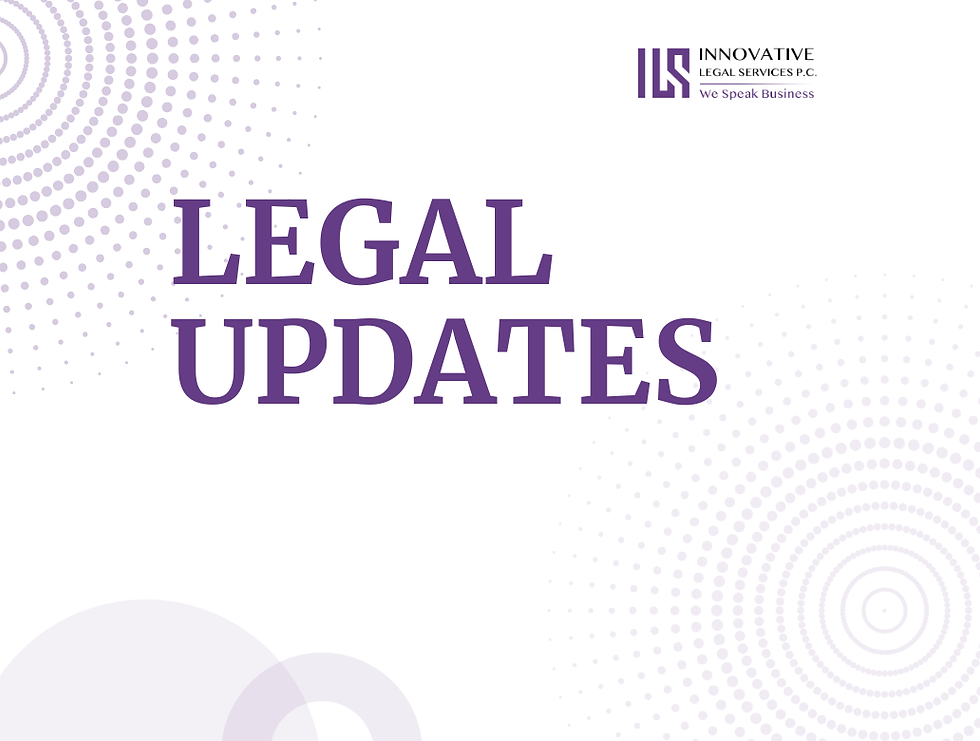FinCEN – U.S. Companies Must Report Beneficial Ownership, Effective January 1, 2024
- Fiona Xu

- Jan 29, 2024
- 4 min read
On December 14, 2023, the Financial Crimes Enforcement Network (FinCEN) of the U.S. Department of the Treasury released a final rule requiring U.S. registered companies to disclose the identities of their beneficial owners. While the regulation aims to prevent misuse of legal entities and reduce financial crimes and threats to security, it broadly impacts most types of businesses, with only limited exceptions. Virtually all companies registered in the United States must adhere to these reporting mandates.

Failure to submit reports on time may result in significant penalties, as well as criminal and civil repercussions for any individual who intentionally submits false or misleading information about beneficial ownership to FinCEN, or who deliberately neglects to provide complete and updated information about beneficial ownership.
For additional information regarding the Beneficial Ownership Information (BOI) report, and to find out how this could impact your business, please contact our Head of Corporate Transaction, Fiona Xu, at fiona.xu@consultils.com.
Who is obligated to file the Beneficial Ownership Information (BOI) report?
Most of companies registered in the United States are obligated to comply with these reporting requirements unless they qualify for exemptions or are already subject to government supervision. Reporting Companies includes:
Domestic reporting companies: including corporations, limited liability companies, and any other entities created by the filing of a document with a secretary of state or any similar office in the United States.
Foreign reporting companies: entities (including corporations and limited liability companies) formed under the law of a foreign country that have registered to do business in the United States by the filing of a document with a secretary of state or any similar office.
Exempted Entities
The regulations list 23 types of exemptions from reporting, as listed below. Most of the exemptions are aimed at companies that are already subject to extensive federal or state regulations, and their beneficial ownership may already be known to the public.

For small and medium-sized businesses operating in the United States, the exemptions that are most likely to apply include:
Fully owned subsidiaries of publicly traded companies.
"Large operating companies," as defined by the regulations: (A) employing over 20 full-time employees in the United States; (B) maintaining physical offices within the United States; and (C) having submitted federal income tax or information returns in the United States for the preceding year, demonstrating a total revenue or sales figure exceeding $5 million.
It's important to note that for the purpose of the definition, the entity itself must have over 20 full-time employees in the United States, and this count cannot be combined across various entities within the same group. Additionally, the revenue criteria exclude any revenue or sales generated outside the United States.
For further clarity, companies can refer to FinCEN’s Small Entity Compliance Guide, which offers additional details to help determine eligibility for any exceptions.
When do you need to submit a BOI report?
Companies created or registered to do business before January 1, 2024, will have until January 1, 2025 to file the initial beneficial ownership information report.
Companies created or registered on or after January 1, 2024, and before January 1, 2025, will have 90 calendar days after receiving notice of the company’s creation or registration to file the initial BOI report.
Companies created or registered on or after January 1, 2025, will have 30 calendar days from actual or public notice that the company’s creation or registration is effective.
Who are beneficial owners?
Beneficial Owner refers to an individual who meets any of the subsequent criteria, either through direct or indirect means:
An individual who wields significant influence over the company, which may encompass roles like the company's CEO, Secretary, CFO, COO, irrespective of whether they possess ownership of the company.
An individual who possesses or oversees a minimum of 25% of the company's ownership. If the shareholders of the reporting company consist of other corporate entities, it is necessary to follow a meticulous tracing process to identify the ultimate individual in control of the company.
FinCEN provides checklists and examples that may assist in identifying beneficial owners, which can be accessed online at https://www.fincen.gov/boi-faqs#D.
What are the consequences for non-reporting?
The CTA has empowered the imposition of both criminal and civil penalties on individuals who knowingly provide false or fraudulent beneficial ownership information to FinCEN, including:
Civil penalties of up to $500 per day for each ongoing or unresolved violation, with no upper limit; and
Criminal penalties of up to two years imprisonment and a fine of up to $10,000.
How will I report my company’s beneficial ownership information?
The report can be made online through a secure filing system available via FinCEN’s BOI E-Filing website (https://boiefiling.fincen.gov).
For additional information regarding the Beneficial Ownership Information (BOI) report, and to find out how this could impact your business, please contact our Head of Corporate Transaction, Fiona Xu, at fiona.xu@consultils.com.

Fiona Xu, Esq. is the Partner and Head of Corporate Transaction of ILS. She works with clients in a wide range of industries and at all stages of their life cycles. She helps companies maximize the value of their strategic relationships and the return on their equity investments, both domestically and internationally.
Email: fiona.xu@consultils.com | Phone: 626-344-8949
*Disclaimer: This article does not constitute legal opinion and does not create any attorney-client relationship.


Comments